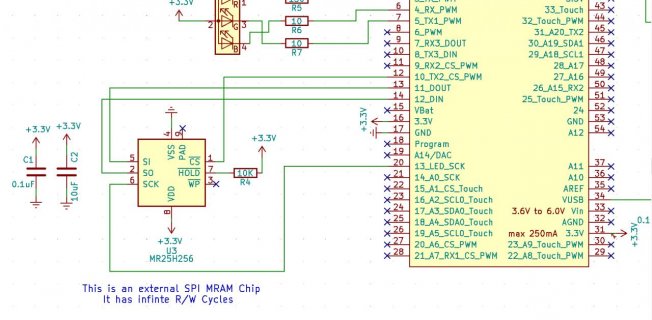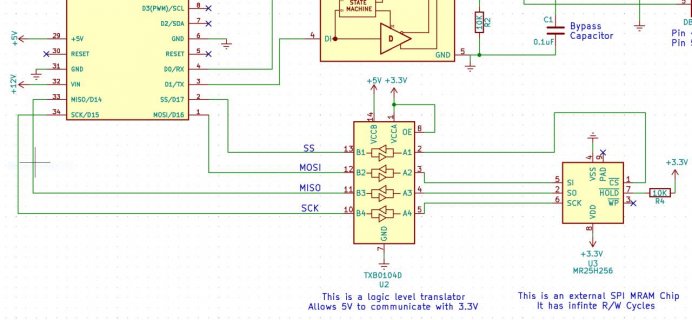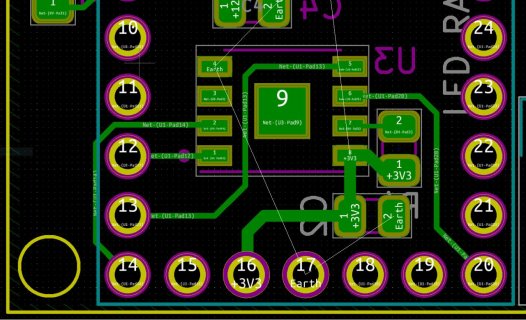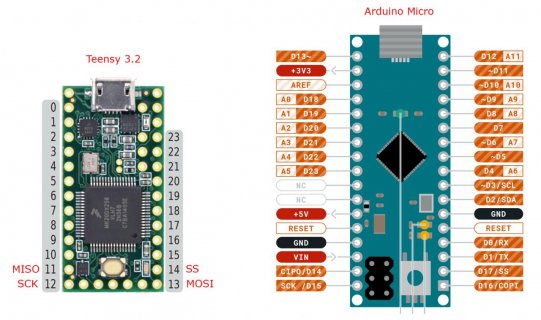Hey everyone,
I'm working on a project that uses an Everspin MR25H256 SPI MRAM Chip. This is similar to FRAM and SRAM, it just has increased durability. I was previously using this chip with an Arduino Micro, and everything was working just fine. I decided to upgrade my design to a Teensy 3.2, but I just can't get it to work for some reason.
Previously, I had needed to use a Logic Level Translator (TXB0104D) in order to use this chip with the Arduino Micro, since the chip is 3.3V only. In my new design, since the Teensy 3.2 is 3.3V anyways, I omitted this chip and wired the MRAM straight into the Teensy.
The thing is, the Teensy 3.2 works just fine if I use the old circuit board with the Logic Level Translator, but doesn't work when wired directly for some reason. In order to use the Teensy with the old circuit board, I just declared the SPI pins in relation to the Arduino Micro. So the declaration for the old board is:
CS = 14
SCK = 12
MISO = 11
MOSI = 13
This allows me to literally plug the Teensy 3.2 into the socket for the Arduino Micro and with the addition of 5V, 3.3V and GND, it works totally fine. Yet, if I wire this exact same chip straight into the Teensy 3.2 using the hardware SPI Pins, it doesn't work for some reason. I'm truly at a loss of why this is...
I've attached pictures of my old schematic, new schematic, and the PCB layout. I have GND on a fill, so that's why they are not connected. I'm probably missing something obvious here, but if anyone can help me, I would really appreciate it!



I'm working on a project that uses an Everspin MR25H256 SPI MRAM Chip. This is similar to FRAM and SRAM, it just has increased durability. I was previously using this chip with an Arduino Micro, and everything was working just fine. I decided to upgrade my design to a Teensy 3.2, but I just can't get it to work for some reason.
Previously, I had needed to use a Logic Level Translator (TXB0104D) in order to use this chip with the Arduino Micro, since the chip is 3.3V only. In my new design, since the Teensy 3.2 is 3.3V anyways, I omitted this chip and wired the MRAM straight into the Teensy.
The thing is, the Teensy 3.2 works just fine if I use the old circuit board with the Logic Level Translator, but doesn't work when wired directly for some reason. In order to use the Teensy with the old circuit board, I just declared the SPI pins in relation to the Arduino Micro. So the declaration for the old board is:
CS = 14
SCK = 12
MISO = 11
MOSI = 13
This allows me to literally plug the Teensy 3.2 into the socket for the Arduino Micro and with the addition of 5V, 3.3V and GND, it works totally fine. Yet, if I wire this exact same chip straight into the Teensy 3.2 using the hardware SPI Pins, it doesn't work for some reason. I'm truly at a loss of why this is...
I've attached pictures of my old schematic, new schematic, and the PCB layout. I have GND on a fill, so that's why they are not connected. I'm probably missing something obvious here, but if anyone can help me, I would really appreciate it!





